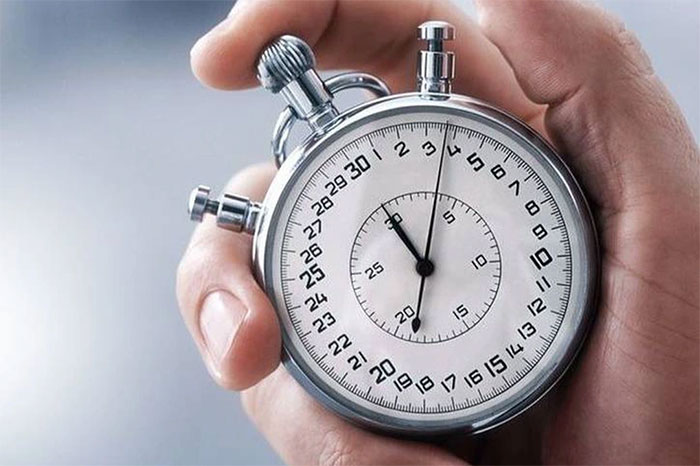The Time Stop Illusion: Why Do Clocks Sometimes Appear to Stop?
You always feel like a fun weekend flies by. Conversely, time seems to stretch like a rubber band when you're stuck in endless meetings.
These are examples of temporal instability - a phenomenon where time can pass faster, or slower, than it actually does.

Why do you sometimes feel like time stops when the clock hands stop? (Illustration: Internet).
Another visual example of time stability is the "stopwatch" illusion. It is created when you suddenly move your gaze to a watch with a traditional second hand.
This action can cause the second hand of the watch to appear to stand still for more than 1 second, which is contrary to the normal perception of time.
Kielan Yarrow, a psychologist at University College London, explains that the key factor in the stopped-clock illusion, as well as time stability in general, is the rapid movement of the eyes from one object to another.
Such movements are called 'saccades .' Yarrow explains that they can cause problems for our brains, causing them to feel surprised by what's happening around us.
'It's like moving the camera on your phone ,' he explains. 'If you move your phone fast enough, you can see a big trail of movement, and the whole world seems to move.'
When our eyes move rapidly, there are gaps in the visual information that they cannot take in. Our brains respond by 'filling in' those gaps to avoid motion 'blur' .
The frozen clock illusion shows the limits of this past-time reconstruction . Specifically, if the clock hand moves during a saccade, we don't see it move, because the brain's reconstruction is based on what it sees at the end of the signal transmission. In other words, you'll see the second hand appear to have stopped, when it's actually moving.

When the brain's expectations conflict with reality, the illusion of time occurs. (Photo: Popsci).
This illusion was demonstrated in an interesting experiment involving video games. The experiment involved asking a group of subjects to play common video games, but they were unaware that there was a short delay built into the game when they pressed buttons on the controller.
This delay is just enough for our brains to not notice the difference, and it immediately processes information to match this state. The result is that players all have the same feeling that their control actions on the screen are seamless.
However, when the delay is suddenly eliminated, players immediately feel like the on-screen image happened before they pressed the control button.
Like the stopped-clock illusion, the brain's expectations conflict with reality, resulting in what the subject experiences as a distorted illusion of time.
Yarrow notes that these effects are usually very short-lived, as our brains soon synchronize the output signals to get the correct information.
Yet experiments like these clearly demonstrate that our perception of time is inconsistent, and that many events that occur in everyday life can influence how we experience time.
'You can see time moving fast, slow down, or even stop. But then you quickly snap back to reality and never get stuck in it ,' Yarrow said.
- Mysterious 'strange disease' caused time to stop
- Time is just an illusion of people, what will happen if that illusion collapses?
- Rare earth elements can help redefine time
- Looking at this illusion, do you realize this is a car door or a beach after a storm?
- Illusion of concave house background deceiving many people
- China has produced optical clocks
- Discover ancient clocks that measure time using water
- Watching the clock for 14 years is a way to prove Einstein's theory
- The illusion of
- Visual illusion 'brain pain' most: This picture is white, or black background?
- Experience the world's most powerful visual illusion
- Japan made the world's most accurate watch pair
 'Fine laughs' - Scary and painful torture in ancient times
'Fine laughs' - Scary and painful torture in ancient times The sequence of numbers 142857 of the Egyptian pyramids is known as the strangest number in the world - Why?
The sequence of numbers 142857 of the Egyptian pyramids is known as the strangest number in the world - Why? History of the iron
History of the iron What is alum?
What is alum? A day in Japan can be up to 30 hours long, does this country live in a different 'timeline'?
A day in Japan can be up to 30 hours long, does this country live in a different 'timeline'?  Why are 76% of rich people introverts?
Why are 76% of rich people introverts?  What time of day is the easiest to fish?
What time of day is the easiest to fish?  Shocking Research: It's Possible to Stop Time
Shocking Research: It's Possible to Stop Time  Closed 'time tunnel' waiting to open after 6,000 years
Closed 'time tunnel' waiting to open after 6,000 years  Why do doctors have to remove appendix before going to Antarctica?
Why do doctors have to remove appendix before going to Antarctica? 